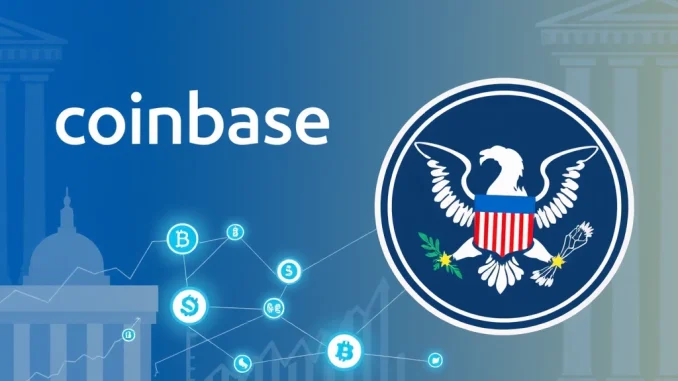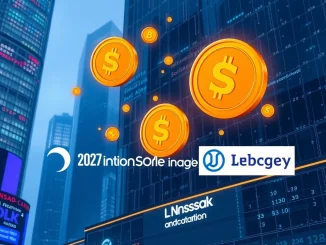
Big news from the world of digital assets! Cryptocurrency exchange giant Coinbase is reportedly taking a significant step towards bridging the gap between traditional finance and the blockchain space. According to a report from Watcher Guru on X, Coinbase SEC interactions are heating up, with the exchange seeking approval from the U.S. Securities and Exchange Commission (SEC) to offer blockchain-based stocks.
This move, if successful, could mark a pivotal moment for both the crypto industry and traditional financial markets, potentially paving the way for a new era of trading and ownership.
What Exactly Are Blockchain Stocks and Tokenized Securities?
Before diving deeper into Coinbase’s request, let’s clarify what we mean by blockchain stocks or tokenized securities. In simple terms, these are traditional financial assets, like shares in a company, represented digitally on a blockchain network. Instead of owning a paper certificate or an entry in a traditional brokerage’s database, you own a digital token on a blockchain that represents your ownership of the stock.
Think of it like this:
- Traditional Stock: An entry in a centralized ledger managed by a brokerage or clearinghouse. Trading happens through intermediaries.
- Blockchain Stock (Tokenized Security): Ownership recorded on a distributed, immutable ledger (a blockchain). Trading can potentially happen peer-to-peer or through specialized digital asset platforms.
These tokens can represent full shares or even fractions of shares, making high-priced stocks more accessible to smaller investors.
Why is Coinbase Pursuing Tokenized Securities?
Coinbase’s interest in tokenized securities isn’t new, but actively seeking SEC approval signals a serious commitment. Several factors likely drive this initiative:
- Innovation and Efficiency: Blockchain technology offers potential for faster settlement times (minutes/hours vs. days), reduced costs, and increased transparency compared to traditional systems.
- Market Expansion: Offering tokenized stocks could attract traditional investors to Coinbase’s platform and provide crypto natives with access to traditional markets using blockchain rails.
- Liquidity: Tokenization can potentially unlock liquidity for assets that are traditionally illiquid.
- Fractional Ownership: Making it easier for anyone to own a piece of expensive stocks like Amazon or Google.
- Staying Competitive: As other platforms explore digital assets beyond cryptocurrencies, Coinbase aims to remain a leader in the evolving financial landscape.
The Challenge of Crypto Regulation: Navigating the SEC
This is where the request for Coinbase SEC approval becomes crucial and complex. The regulatory status of digital assets, particularly those that represent traditional securities, is a major point of contention in the United States. The SEC views many cryptocurrencies and tokenized assets through the lens of existing securities laws, primarily the Howey Test.
Seeking explicit approval from the SEC is a strategic move by Coinbase to ensure any offering of blockchain stocks is compliant from the outset. However, navigating the current crypto regulation environment is challenging due to:
- Lack of Clear Framework: The U.S. doesn’t yet have a comprehensive, tailor-made regulatory framework specifically for digital assets.
- SEC Scrutiny: The SEC has taken enforcement action against platforms listing tokens it deems unregistered securities.
- Jurisdictional Battles: Disagreements exist between regulatory bodies (like the SEC and CFTC) over who has primary oversight for different types of digital assets.
- Investor Protection Concerns: The SEC’s primary mandate is investor protection, and they will scrutinize how tokenized stock platforms ensure market integrity, prevent manipulation, and handle custody of assets.
Coinbase will need to demonstrate to the SEC that their proposed system for offering blockchain stocks meets all necessary requirements for registration, trading, clearing, and settlement under existing securities laws, or argue for modifications/exemptions where blockchain technology provides equivalent or superior safeguards.
What Does This Mean for Digital Assets and Investors?
Coinbase’s pursuit of digital assets in the form of tokenized stocks has significant implications:
- For Investors: Potential access to a new, potentially more efficient way to trade stocks, including fractional ownership. However, it also means needing to understand the unique aspects and risks of blockchain-based trading.
- For Traditional Markets: Could pressure traditional brokerages to explore blockchain technology. May lead to increased efficiency but also disruption.
- For the Crypto Space: Represents a major step in legitimizing blockchain technology for mainstream finance and could drive further adoption and development of digital asset infrastructure.
- For Regulation: Forces regulators like the SEC to directly address the specifics of tokenized securities, potentially accelerating the development of clearer rules.
This isn’t just about Coinbase; it’s about the potential convergence of two massive financial worlds. Success here could set a precedent for tokenizing other asset classes like bonds, real estate, and private equity.
Actionable Insights
While SEC approval is far from guaranteed and could take considerable time, this development offers several insights:
- Stay Informed: Keep a close watch on SEC announcements and Coinbase updates regarding this application. Regulatory clarity is key.
- Understand the Technology: Learn about how tokenization works and the potential benefits and risks compared to traditional methods.
- Evaluate Platforms: If approved, assess how Coinbase (or other platforms) implements tokenized stock trading – focusing on security, fees, and regulatory compliance.
- Consider Diversification: Tokenized assets could become a new avenue for portfolio diversification in the future.
This move underscores the increasing overlap between crypto and traditional finance and the ongoing efforts to define the future of digital asset trading under existing regulatory frameworks.
A Compelling Future?
Coinbase seeking SEC approval for blockchain stocks is a bold move that highlights the potential of tokenization to transform traditional markets. While the path through crypto regulation is fraught with challenges, the pursuit of compliant digital assets like tokenized securities could unlock significant efficiencies and accessibility for investors worldwide. The outcome of these Coinbase SEC discussions will be a critical indicator of how quickly and smoothly the worlds of blockchain and traditional finance will converge.



